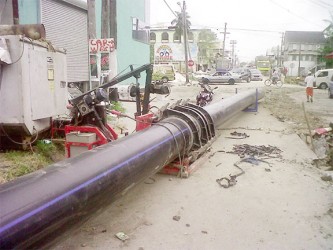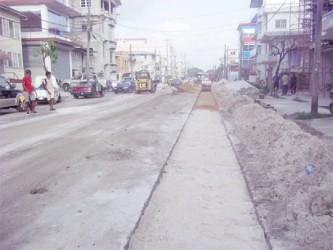The Georgetown Sanita-tion Improvement Pro-gramme (GSIP), which saw several streets across Georgetown dug up and disrupted over the past few months, has been completed.
Restorative road work is expected to be completed over the next three months, Ministry of Housing and Water Permanent Secretary Emil McGarrell said at a public seminar hosted by the Guyana Water Incorporated (GWI) at the Regency Suites yesterday. The GSIP was funded by the IDB to the tune of US$10 million.
McGarrell urged businesses to utilise their corporate and social responsibility programmes to assist in the improvement of sanitation in Guyana. He went on to say that private contractors attached to the project are now capable of effecting repairs to the disrupted roadways, which were excavated to facilitate the substantial civil works. McGarrell said GWI is collaborating with the Ministry of Public Works to ensure that the restoration of the roadways is done in strict compliance with the contracts signed with the private contractors S Jagmohan Hardware Supplies and Contracting Services along with Nabi and Sons Limited.

o ensure that the companies adhere to the technical and environmental requirements of their contract and to ensure the highest quality of finished product, the agency is relying on the supervisory help and oversight of GITEC Consult in association with E&A Consultants Incorpo-rated, McGarrell said. When questioned about the specifics of assessing the quality of work the contractors are providing, McGarrell said there will be round-the-clock supervision and this will ensure the exact type of material and quantities are used. He explained that any infractions on the contractors’ part could result in financial penalties or a complete revocation of their contract.
The major components of the programme included the complete replacement of the 5.5km of sewerage ring main in Georgetown, replacement of all delivery mains; purchase and installation of additional pumps for 24-hour pump stations to ensure adequate pressure, operational reliability and the improvement of electrical connections. The programme also involved an assessment and emergency rehabilitation of street sewers in selected areas and the purchase of maintenance and operating equipment. Wastewater Management and Energy Efficiency was another major component of the programme.
Orin Browne, Pro-gramme Manager GSIP, in a presentation titled, ‘An Overview of the GSIP,’ stated that the old the sewerage and sanitation system has been in place ever since 1929. Residential, commercial and industrial development since then put pressure on the system. The problems faced included deterioration of the pipes due to age; underground and surface leaks detected in the force main and external trench-crossing pipes, insufficient depth of the force main pipes in relation to drinking water distribution network and instability of electricity supply at the pumping stations. The consequences of allowing the problems to persist were frequent blockages, interruptions and ruptures; wastewater overflows into the drainage canals; back-up onto streets and

backyards; potential for significant health risks, proliferation of lymphatic filariasis (LF) vectors and other water-related neglected tropical diseases (NTD), such as intestinal helminthiasis, placing a significant percentage of the population in Region 4 at risk of infection.
The main goals of the programme, he said, were to improve the operational performance of the Georgetown sewerage system through the reconstruction of its most critical components; to strengthen GWI operational and financial performance by improving asset management and decreasing energy consumption and to limit the transmission of the water-related diseases lymphatic filariasis and intestinal helminthiasis. To achieve the desired outcome, GWI sought to rehabilitate Georgetown’s sewerage system, strengthen GWI institutionally, and implement an energy efficiency pilot project component and a neglected tropical diseases component.
Browne said the rehabilitation of Georgetown’s sewerage system saw the complete replacement of the 5.5 Km sewerage ring main in Georgetown and the replacement of delivery mains and rehabilitation of all trench-crossings. It included the purchase and installation of additional pumps for the 24 existing pumping stations at the corners of Fort-Barrack, Parade-Barrack, New Garden-Laluni, Light-Second, Camp-New Market, Main-New Market, New Garden-Forshaw, Light–Fifth, Camp-Quamina, Main–Quamina, New Garden-Regent, Light-Regent, Camp-Regent, Regent-Avenue of the Republic, Haley-Hadfield, Winter Place-Hadfield, Camp-Hadfield, High-Hadfield, Louisa Row-Princes, Princes-Russell, High-Princes, Cooper-Princes, Hunter-Sussex and Sussex-Saffon streets in various city wards. The project also saw the assessment and emergency rehabilitation of street sewers in selected areas and purchase of maintenance and operating equipment.
With regard to institutional strengthening of GWI, this component, Browne said, addresses the need to strengthen GWI’s Wastewater Management Division and energy efficiency. This has been done via public awareness campaigns, specifically targeted towards schools and businesses (hotels and restaurants in particular). More than 25 workshops have already been held in Georgetown and across Region 4 which have targeted improved hygiene and sanitation practices. Another 15 workshops are to be conducted across the country. Posters and tokens are also distributed during the course of the workshops.
The third component of the programme, the Energy Efficiency Pilot Project, will address the need to improve energy use within GWI facilities.
Component 4 seeks to address NTDs, specifically the need to control and, where feasible, eliminate water-related NTDs in Region 4. This is an ongoing exercise that involves mass drug administration activities (Diethylcarbamazine and Albenda-zole) to interrupt transmission and decrease the prevalence of NTD. It requires community mobilization and communication for behavioural change; monitoring activities and component management activities.
The seminar was also addressed by Executive Director, Corporate Services Nigel Niles, Chief Executive Officer Shaik Baksh and Rensford Joseph, Manager, Sanitation. Ramchand Jailal, Executive Director, Infrastructure Planning and Implementation, gave brief closing remarks.




